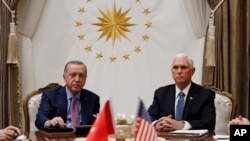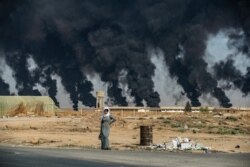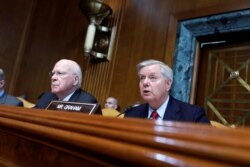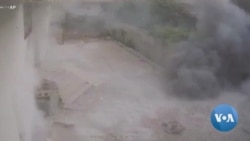Turkey agreed Thursday to a 120-hour cease-fire in its assault on Kurdish fighters in northern Syria, U.S. Vice President Mike Pence announced in Ankara, after extensive talks with Turkish President Recep Tayyip Erdogan.
Fighting continued Friday morning despite the cease-fire, according to news reports from the Associated Press of shelling and gunfire in and near Ras al-Ayn. Elsewhere along the border, calm prevailed.
Pence said the pause in Turkey's weeklong offensive would give Kurdish YPG fighters a window to leave the 32-kilometer-wide buffer zone just south of the Turkish border with Syria. He said the halt in hostilities was aimed at ensuring "peace and security is the order of the day" in the volatile region, and it came after five hours of discussions between Turkish and U.S. officials.
But local Kurdish news outlets reported that a longtime Syrian Kurdish politician, Aldar Xelil, who often speaks for Syrian Kurds, said, "We've previously stated that the proposal of Turkey's entering a depth of 30 km inside Syrian territories is rejected." He said Kurds would defend themselves if attacked during the cease-fire.
Pence said Turkey and the United States "mutually agreed" to hold peace talks on the fate of the territory and how the two countries could continue to fight Islamic State insurgents, some of whom have escaped since Turkey started its attacks on the Kurds after Trump unilaterally withdrew nearly all American troops from the region.
Trump said that as a result of Turkey's agreement to pause its offensive, planned U.S. economic sanctions against Ankara were no longer necessary.
On Twitter, Trump said:
The U.S. leader had come under withering political criticism, from both Republican and Democratic lawmakers in the U.S., for withdrawing American troops.
But Trump declared:
Pence was accompanied by Secretary of State Mike Pompeo and White House national security adviser Robert O'Brien in meeting with Erdogan and other Turkish officials.
The meeting came a day after Trump dismissed the importance of the outcome of the fighting, saying it "has nothing to do with us," even as the House of Representatives overwhelmingly approved a resolution condemning his troop withdrawal. Trump instead disparaged the Kurdish fighters, who had fought alongside U.S. troops against Islamic State terrorists, as "no angels."
U.S. Senate leaders announced plans for legislation with wide-ranging sanctions against NATO member Turkey, for the offensive against the Kurdish fighters and also its purchase of a Russian-made defensive missile system against the wishes of the U.S. and other NATO governments. It was not immediately clear whether the lawmakers would continue to try to advance the legislation in the wake of the cease-fire announcement.
Republican Senator Lindsey Graham of South Carolina, a Trump political ally but also a critic of his Syrian troop withdrawal, said, "We believe that Erdogan's decision to go into Syria puts our allies at risk. We believe that the rise of ISIS is imminent if this continues."
Trump, in a letter last week to Erdogan, warned the Turkish leader against carrying out the onslaught against the Kurdish fighters, saying, "Don't be a tough guy. Don't be a fool!" But reports from Turkey said Erdogan threw the short note "in the bin."
Trump said Erdogan risked being branded in history as a "devil" by carrying out the attack on the Kurdish fighters, whom he views as allied with Kurdish separatists who have been battling for autonomy inside Turkey for three decades.
But Erdogan on Wednesday vowed to continue the offensive. With the U.S. troops withdrawn, Kurdish forces struck a deal with Syrian forces to return for the first time in years to northern Syrian outposts, with allied Russian soldiers entering the border town of Kobane.
Trump warned at a news conference Wednesday that economic sanctions he was imposing against Ankara "will be devastating to Turkey's economy."
The U.S. leader said he "didn't give [Erdogan] a green light" for the attacks on the Kurdish fighters, but he was dismissive of the importance of the fighting to the United States.
"Syria may have some help with Russia, and that's fine," Trump said. "They've got a lot of sand over there. So, there's a lot of sand that they can play with. Let them fight their own wars."
Trump told reporters he had no regrets about having 26 to 28 U.S. military personnel inside Syria stand aside as the Turks moved across the border.
"Syria doesn't want Turkey to take its land. I can understand that," he said. "But what does that have to do with the United States of America if they're fighting over Syria's land? Are we supposed to fight a NATO member, in order that Syria, who is not our friend, keeps their land?"
The president also termed the Kurdish rebel group, the PKK, as "worse of a terrorist threat than ISIS."
The Syrian conflict, which began in 2011, had already created a humanitarian crisis, with millions of people fleeing their homes and needing aid.
An estimated 160,000 people have been displaced since the Turkish operation began last week, according to the U.N. refugee agency.
WATCH: Pence Says Turkey Agreed to a 5-Day Cease-fire in Syria
At the news conference Wednesday, Trump expressed deep concern about the Turkish offensive, noting the large number of civilian victims and warning it could lead to a resurgence of ISIS.
Trump on Wednesday also addressed concerns regarding the estimated 50 tactical nuclear weapons stored at a U.S. base in Turkey. The president's response was that he was confident those weapons were secure.










